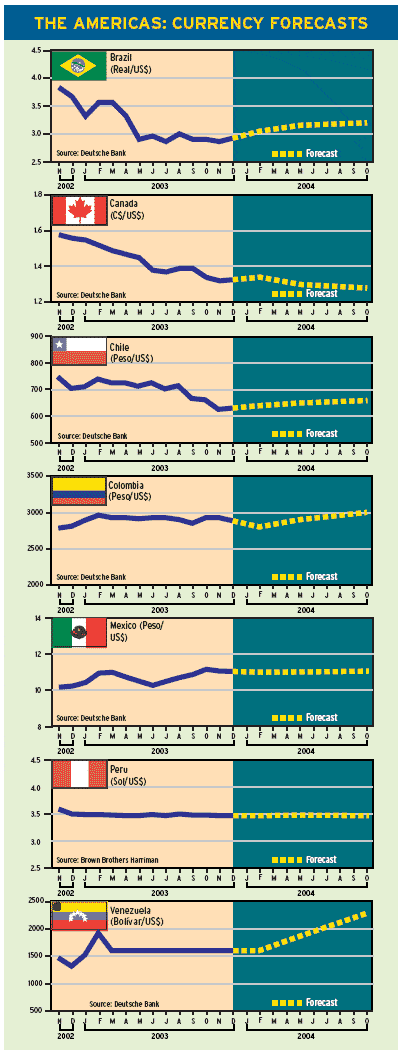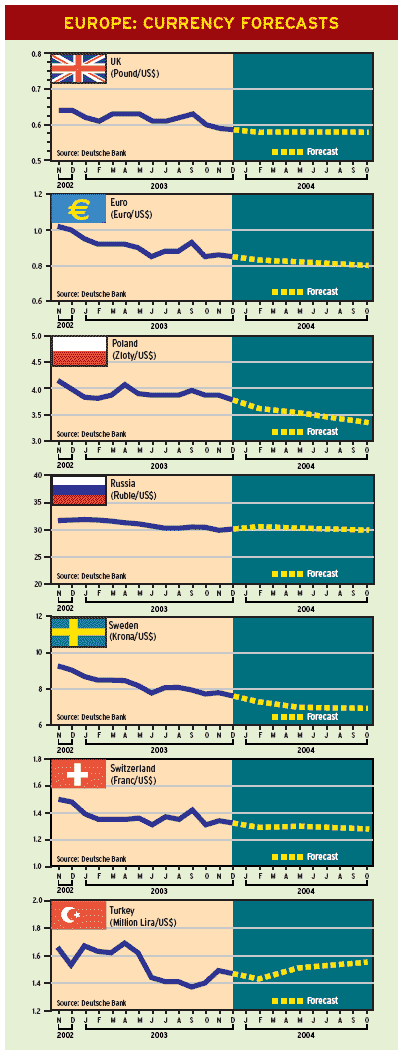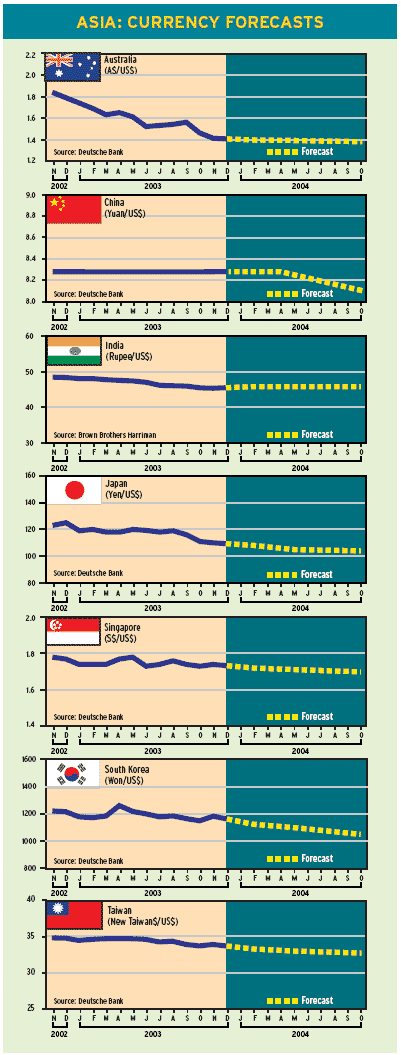THE AMERICAS

The US dollars headlong plunge has suddenly slowed dramatically in response to better-thanexpected reports on the economy, including stabilization of the employment market and a 7.2% rise in third-quarter gross domestic product.
The surge in US economic activity, combined with hints from the Federal Reserve that interest rates will eventually rise, have handed the dollar a parachute in its lengthy skydive, says David Gilmore, partner and economist at Connecticut-based Foreign Exchange Analytics.
The gaping current account deficit and the weak-dollar policy in Washington provide the gravitational pull on the dollar, Gilmore says.However, the roaring economy and growing risk the Fed will renege on its promise to keep monetary policy accommodative for a considerable period of time have created an environment in which it is difficult to sell the dollar, he says.
Hence, I think the dollar is at the very least due to move to a far more gradual descent, and I would not rule out a reasonable bounce,Gilmore says.Markets tend to be myopic, and the focus may well move to the parachute and away from terra firma, he adds.
Not everyone is convinced, however, that growth differentials between the US and the rest of the world are going to help the dollar.
Michael Rosenberg, global head of foreign exchange research at Deutsche Bank in New York, says he questions the validity of the growing chorus of comments suggesting that a pickup in US growth will be supportive of the dollar.
For one thing, the US economy is not the only economy showing signs of strength, he says.The global economy is recovering, and growth differentials wont be a significant factor for the dollar, he adds.
The argument that the pickup in US growth will lead to higher interest rates and a stronger dollar also is not holding up, Rosenberg says.There has not been a shift in favor of US versus foreign yield spreads.The 50 basis-point spread in favor of Europe in short-term rates has remained stable, he says.
The related argument that stronger US growth will spark a rally in the stock market and invite capital inflows is not playing out either, Rosenberg says. From March through mid-November of this year, the German DAX index has outperformed the Standard & Poors 500 stock index, he notes. Meanwhile, there has been no change in capital flows into the US.
The big negative for the dollar is that the faster growth of imports relative to exports as the US economy advances will worsen the trade deficit, Rosenberg says.
Although the US trade deficit has stabilized on a monthly basis in the $39 billion to $40 billion range, US inventories are quite lean and will need to be replenished, he says. This implies that the trade deficit should begin to deteriorate again.
EUROPE History Shows Euro Rises in December
While the euros performance has been disappointing to its backers in recent weeks, analysts say there has not been a major shift in sentiment in favor of the US dollar.
Rapidly improving US economic data have contrasted with less-thanrobust numbers from the eurozone, prompting the unwinding of speculative positions that had helped to boost the euro, says Ashraf Laidi, chief currency analyst at MG Financial Group in New York.

He says the euro could soon bounce back, since the single currency has demonstrated a seasonal tendency to rise in December in every year since 1999.
Whats more, as the European Central Banks monetary policy shifts away from an easing stance into a more neutral positioning, money markets will price in an earlier rate increase in the eurozone than in the US, which should be supportive of the euro versus the dollar, Laidi says.
Strength should also reemerge in the British pound after market participants expect further Bank of England tightening and the central bank maintains its silent approval of the appreciating currency, he says.
From the looks of things, both the British and Australian interest rate hikes announced in early November could be the start of a series of increases in those countries, according to Carl B.Weinberg, chief economist at Valhalla,New York-based High Frequency Economics.
For the first time in a long while,we think interest rate spreads will be a dominant factor in defining currency movements for the next few quarters, Weinberg says.
We should be able to determine where rates are going to go highest the soonest, and we think this will be a good guide to relative currency moves, he says.
Both the UK and Australia have record low unemployment, economic growth in line with longterm trends and with prospects for acceleration, strong consumer demand and very strong housing markets, and excessive credit growth, he adds.
Any signs of recovery in the eurozone are so tepid that tighter money is an inconceivable choice, and no one is seriously thinking about higher interest rates in Japan,Weinberg says.And while the US Federal Reserves next move will be a rate hike, the increase isnt likely before the second quarter of 2004, according to High Frequency Economics chief US economist Ian Shepherdson.
Therefore, the British pound and the Australian dollar should be strong against most currencies, while the US dollar can be expected to rise against the euro and the yen, Weinberg says.
ASIA Japans Election Confuses Market
The Japanese yen dipped initially on news that the ruling Liberal Democratic Party lost seats in Novembers parliamentary elections.
Market participants were disappointed that Prime Minister Junichiro Koizumis governing coalition failed to win an outright majority that would have enabled it to enact reforms more easily.
Analysts say, however, that big gains by the opposition Democratic Party of Japan, which is even more reform-minded than the LDP, should be considered as a good omen for the countrys reform efforts.
We think that the outturn of the election will have little if any policy impact in the near term, says Anne Mills, director of currency research at Brown Brothers Harriman in New York.
Over the longer term, the outcomeparticularly the strong showing by the opposition DPJis good news for Japanese reform, Mills says.
The election showed strong progress toward a real two-party system in Japan, she says.The LDPs dominance has enabled the emergence of a special interests economy, where change is blocked on all sides, she notes.
Marc Chandler, chief currency strategist at HSBC Bank (USA) in New York, says many market participants fear that Koizumi may lose ground to the old guard within the LDP and that the DPJ remains too weak to enact its reform agenda.
Although it may sound counter-intuitive, doubts over the extent of reform in Japan should lead to a strengthening of the yen on ideas that without reform, Japan will continue to struggle to recycle its current account surplus, Chandler says.
Meanwhile, Japans currency authorities remain likely to continue intervening to counter yen appreciation, which would threaten the countrys economic recovery.
The Bank of Japan sold $25 billion worth of yen in the foreign exchange markets in October, bringing the amount sold in the first ten months of 2003 to $140 billion.That helped to boost the countrys reserves to a massive $605 billion.

Gordon Platt



